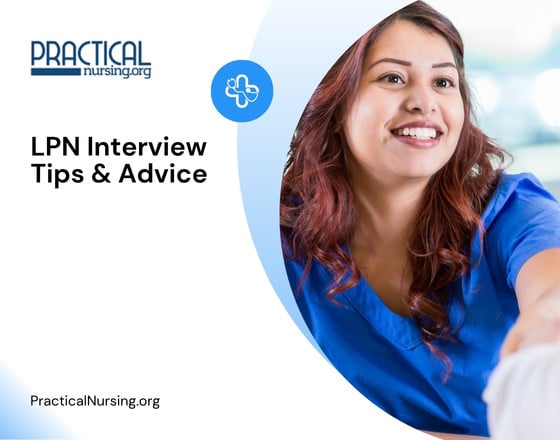LPN Interview Tips & Advice


You’ve passed the NCLEX-PN, you’re written your resume, searched for LPN Jobs, and now you are preparing for a job interview which can be stressful, overwhelming, or even downright scary. While there are certain elements of a job interview that are out of your control, there are some things you can do to prepare. Good preparation for an interview can make the difference between a callback or even being hired on the spot and being told they went with another candidate.

Dress for Success
This is arguably one of the most important interview tips. The way people dress says a lot about them. In the case of a job interview, you want to present yourself as someone the employer wants to hire. This is about appearing neat and professional to the interviewer. Many people have heard the adage “Dress for the job.” In the case of nursing interviews this may not always be the best idea. Wearing scrubs may seem like a good idea because they are often the uniform of choice for nurses. However it is better to dress in business attire. Your future employer will likely see you in scrubs every day; they need to know you are capable of being a professional and dressing as such.
Dressing in business or business casual attire is the best way to appear professional to potential employers. This generally means modest and well-fitting clothing. Men should wear at least dress pants (not blue jeans) and a button down shirt. Ideally men should wear a tie and a suit jacket. In fact, we highly suggest wearing a tie; necktie or bow tie but no clip ons. Nowadays there are many professionals who are overly laxed while making first impressions. Separate yourself from the rest by showing you care for the position applying for. Women should wear either dress pants (again, not jeans) or a skirt and a blouse. Women should wear a jacket to enhance their look. Accessories and jewelry should be modest and kept to a minimum. For women this means one or two rings, conservative or no earrings, and a watch if desired. Necklaces should be worn inside the blouse. Many employers have policies concerning jewelry and piercings. Men should wear a nice watch and very minimal jewelry. In addition, both women and men should cover tattoos if possible. While some work place accept visible tattoos, many have policies against them. Be sure to keep perfumes and colognes to a minimum or just don’t wear them.
Another important aspect of how to dress for a job interview that is often overlooked is the color of clothing. The right colors can express self-confidence and a professional appearance. There are three main rules when choosing interview clothing:
- Choose solids over patterns
- Choose neutral colors over bright colors
- Know the workplace environment

Wearing solid colors looks professional without being distracting. Navy, gray, and black pinstripes can be a good choice. Neutral colors should be the base; bright colors can be added in small amounts. Popular color choices for interview attire include: brown, blue, gray, black, white, and khaki. Brighter colors such as red, yellow, or gold can be great accents. Also knowing the environment of the facility you are interviewing for can provide valuable insight to their dress code expectations.
Interview Timing
Always arrive early to a job interview. This cannot be stressed enough. Ideally you should arrive between 10 and 15 minutes early. This shows the potential employer that you are serious about wanting the job, eager, and punctual. These are all positive things to show the interviewer before even meeting them. Arriving more than 15 minutes is not recommended. This can lead to anxiety due to long wait times before the interview. Arriving too early can also make the interviewer feel rushed.
The worst thing you can do is arrive to an interview late. This says to a potential employer that you may be irresponsible or undependable. Not a good first impression. Even though there really may have been traffic or a flat tire, employers have heard it all. Excuses usually do not go far. Many interviewers will cancel the interview all together if you are late. The best thing to do is leave early. Plan to leave plenty of time for traffic or other delays. If you arrive to the facility too early to go in, wait in the car or drive around the block to pass some time.
Do Your Homework
Researching the company and facility you are interviewing for is always a good idea. Finding out about a facility can ensure a good match for both parties. In addition, many interviewers ask questions about the company or will simply ask what you know about the facility. Being knowledgeable can impress your potential employer. One of the best and easiest ways to gather information about a potential employer is by visiting their website. You can also Google the company name and find a variety of results for the company including news, web results, and images. Social media can also be a valuable resource for getting to know some companies. Another great way to find out information about a company is from a current employee, especially if they have the same position you are applying for. People working at a facility will be able to tell you insider information that would not be found on the company website.
Expect the Unexpected
It is often impossible to judge how the interview will play out. It is up to the applicant to prepare themselves for what may happen. It is also important to be prepared for nontraditional interviews. These can include telephone interviews, which are used by some companies. Phone interviews can be the first in a set of interviews or the only interview given. Always speak professionally and answer interview questions in the best way you can.
Another type of interview that some facilities use is group interviewing. This is exactly what it sounds like, candidates for a job are interviewed as part of a group. This can be combined with an individual interview or it may be the only interview. When in group situations be sure to be assertive and confident. Also be sure you don’t interrupt others or overpower the group.
Common LPN Interview Questions & Responses
It may be impossible to predict which questions will be asked during an interview. However, there are certain questions that are commonly asked. Knowing these questions and practicing your answers can make the difference during an interview and can lead to being hired. This list is by no means all inclusive; there are hundreds of questions that could be asked during an interview. Expect the unexpected. The most important thing to remember is to be honest! Always give complete and truthful answers.
- What inspired you to be a nurse?
 This is a question all nurses should be comfortable answering. This question is asked during almost every interview. There are various forms of this question including: “Why did you become a nurse?” or “What made you decide to become a nurse?” No matter how it is phrased this question is an important one. This question is one that is aimed at the core of every nurse. If you haven’t thought about this yet, think about it now! There are various reasons for wanting to become a nurse.
This is a question all nurses should be comfortable answering. This question is asked during almost every interview. There are various forms of this question including: “Why did you become a nurse?” or “What made you decide to become a nurse?” No matter how it is phrased this question is an important one. This question is one that is aimed at the core of every nurse. If you haven’t thought about this yet, think about it now! There are various reasons for wanting to become a nurse.
Many want to help others, some are inspired by other family members or friends, still others are intrigued by the medical side of nursing and like the gory details. Most likely the answer is multi-faceted and complex. There is no wrong or right answer to this question, just be sincere and truthful to yourself.
- Why do you want to work here?
This is a very commonly asked question as well. There are many settings and facilities in which nurses can work. The interviewer wants to know why you chose their facility. The answer to this question can be augmented by researching the company before hand. Having some background can provide concrete reasons to work for the company and let the employer know you did your research. Another good thing to do when applying to a facility is to ask about its reputation. Ask around and see what can be found “through the grapevine.” Of course take personal testimonies with a grain of salt and remember there are always two sides to every story. However if a facility has a good reputation, it is most likely well deserved. Show the interviewer that you did your homework and let them know that you like their positive reputation. Find out if the facility you are interviewing for has a special focus or function; rehabilitation, geriatrics, pediatrics, oncology, etc. If you are drawn to a facility because you want to work in a certain specialty, let the interviewer know that. They will likely be happy you chose them over similar facilities.
- How do you handle stress?
This is a question interviewers love to ask. Stress is an inevitable part of any job, especially in nursing. Nurses have some of the highest levels of job related stress of any career. Some specific stressors vary depending on position and facility; some are universal. Either way you can count on having to manage stress on the job. The key to this is learning what works for you. Once you figure this out, you can easily relay this to a potential employer. Good ways to manage stress on the job can include simple things such as deep breathing or counting to ten. As cliché as they sound they can often work. Other more creative ways to manage stress include preventing it in the first place. Good organizational skills and time management skills can make the difference between a crazy or stressful shift and one that is more under your control. Collaborating with other team members and not being afraid to ask for help when it is needed are also great ways to decrease stress. One important thing to remember is that as nurses, we are there for the patients. We are there to ensure high quality care. It is important to stay calm and focused during stressful situations.
 Of course, there are less than desirable answers to this question as well. One common method of stress management is smoking. Despite knowing the dangers millions continue to smoke cigarettes and nurses are no exception. This is not a good thing to tell potential employers. Never lie if the interviewer asks, but don’t give smoking as one of your preferred stress management techniques.
Of course, there are less than desirable answers to this question as well. One common method of stress management is smoking. Despite knowing the dangers millions continue to smoke cigarettes and nurses are no exception. This is not a good thing to tell potential employers. Never lie if the interviewer asks, but don’t give smoking as one of your preferred stress management techniques.
This is unprofessional and not in the best interest of you or your patients. Many facilities nationwide have a ban on smoking for patients and employees.
- What is your biggest strength?
Employers often ask for greatest strength or strengths during an interview. This can provide valuable insight into a nurse and their self-concept. Take the time to think about a complete and honest answer to this question. Do not misrepresent or exaggerate yourself to sound good. Everybody has their own strengths. It is important to recognize these and highlight them. Common answers to this question can include: patience, intelligence, problem solving ability, dealing with stress, interacting with patients or their families, etc. The list of possible answers to this question is almost unlimited. The important thing is to be confident but not arrogant. Be assertive and proud of your strengths!
- What is your biggest weakness?
This is commonly asked before, after, or together with the previously mentioned question. When preparing for this common question, take the time to really think about your weaknesses and how you can improve them. Be honest with yourself and find areas where you need personal or professional improvement. There are several ways to approach this question. One way to answer this question with a positive spin is answering by stating a weakness in which you have or are currently improving. This shows a potential employer that you are conscientious and capable of self-improvement. Consider the following example:
“Being organized was not always my strong point; however at my last job I worked with a co-worker whom I admired for her time management ability. She helped me to develop a system for time management and organizing my day. This has helped me and I plan to continue my self-improvement.”
In this sample response the nurse identifies a potential weakness, organizational skills, then goes on to explain how they recognized the weakness and are attempting to fix it. Another great way to answer this question is to focus on nonessential skills. These are skills that are not necessarily needed to complete a job. For example, as a nurse communication skills are very important. Some nurses are great at communicating one on one with patients or in small groups with family members yet they lack the ability for public speaking to larger groups of people. If this is true, be honest. State your weakness but don’t forget to also emphasize the strength that goes with it.
- Do you prefer to work alone or as part of a team?
This question can be a tricky one to answer. One way to overcome this is simply to not pick one option. Spin the answer to show that you have the ability to work in both situations. Nurses are part of a larger healthcare team which is responsible for patient care. As such, nurses must be able to work as part of a team. Emphasize your ability to collaborate as well as being able to work independently; both are critical skills for nurses.

- How would you handle a family member who is unsatisfied with a patients care?
This question has a fairly straight forward answer. Make sure to apologize to the family member, even if you have done nothing wrong. Then listen to their concerns and gather any necessary information. Assure the family member that their loved one is receiving high quality care and that they will be taken care of. If there are any concerns the family member has that require investigation or follow-up, always do it! See ways to educate patients. Interviewers want to know you have the ability to problem solve as well as the ability to communicate effectively and be sincere with patient families. Never tell a family member that you do not have time for them or their loved one. Be empathetic and act as if it were your loved one being cared for.
- What would you do if you saw another staff member…?
…do something wrong? …break policy and procedure? …mistreat a patient? This question has several variations but all are aimed at the same issue. The interviewer is trying to figure out if you have integrity and are trustworthy. While it may not be first instinct to “rat out” a fellow nurse or other employee, you must remember the bottom line: patient care and safety. If you see another nurse mistreat a patient or break a rule that could lead to patient harm speak up! There are procedures in place that protect whistle blowers. Always follow the chain of command in your facility and report things that need to be reported.
- Where do you see yourself in 5 years?
This is a question no one can answer for you. This is a question that must be thought about and answered honestly. Interviewers can often spot dishonesty and answers that are confabulated just to sound good. Think about where you see yourself in 5 years… really think about it if you haven’t already. Many LPNs interviewing for nursing jobs are already enrolled in or plan to attend RN school. This is a good thing to let the interviewer know. Let them know your intentions to become a Registered Nurse and why you want to further your education. If you have a certain nursing specialty in mind, convey this, especially if it is relevant to the facility you are interviewing for. When interviewing potential hires, employers don’t need or want to hear that you want to work for them forever; they simply need to know that they will be rewarded for “investing” in you as an employee. Try to tie the job you are applying for with your future goals. Focus on the experiences and knowledge you want to gain from working at a certain facility. Also focus on the impacts and influences you wish to have on patients and others working at a certain facility.
- Scenario Questions
Many employers are asking scenario questions during interviews. These are questions in which a short scenario or problem is presented and either preceded or followed by “What would you do in this situation?” These questions often present a problem with other employees or more commonly with a patient. For example they may ask what you would do if a patient codes or presents with certain symptoms. These types of questions are hard to prepare for and impossible to predict.
The best way to answer these questions is to the best of your knowledge. Stay calm and remember that you are a nurse; you have passed nursing school, and even the NCLEX! Really listen to the question, ask for it to be repeated if you do not understand. Then give the best answer you know how. Do not be afraid to say that you would ask for assistance or report a happening to a supervisor. Sometimes questions like these may be asked to gauge a nurse’s knowledge of their scope of practice. Rely on your nursing knowledge and critical thinking skills to picture the scenario, then do what you know is right.
Questions You Should Ask During an LPN Job Interview
 If you have read our section above on common LPN interview questions you are probably feeling fairly confident in your ability to answer interview questions. However, there is also another side to interview questions that many LPN’s forget about. The purpose of a job interview is to find out if a potential employer and a nurse are a good fit for each other.
If you have read our section above on common LPN interview questions you are probably feeling fairly confident in your ability to answer interview questions. However, there is also another side to interview questions that many LPN’s forget about. The purpose of a job interview is to find out if a potential employer and a nurse are a good fit for each other.
Compatibility goes both ways; don’t be afraid to ask your interviewer questions. Of course, don’t interrupt them or bring up inappropriate topics. Do ask relevant questions that will help you in your decision to accept or turn down a potential job offer. Most interviewers will ask towards the end of an interview if the applicant has any questions. Asking questions shows sincere interest and can help to clear up any miscommunication if present. Below are several sample questions that are good to ask during an interview.
- What are the daily duties of this position?
Job duties and responsibilities can vary greatly depending on facility, patient load and acuity, and the healthcare setting. If the interviewer does not go into some detail about what you will actually be doing on a daily basis, don’t be afraid to ask. Knowing the specifics of what you will be doing can help ensure the position is a good match. Some LPN positions are aimed more at basic care of patients. Many LPN positions are medication or treatment nurse positions. LPN’s are often designated as charge nurses as well. Being a charge nurse adds a list of responsibilities which can range from writing care plans and supervising care to supervising nursing assistants. Many practical nurses are given supervisory positions straight out of school. If your school offered a leadership class or similar you may feel prepared for this. Some nurses do not desire the extra responsibility of a charge nurse status.
- What is the nurse-to-patient ratio?
Finding out how many patients, residents, or clients you will be responsible for is very important. This can vary extremely and can depend on patient acuity, facility standards, and legal requirements. There are no specific federal standards for the number of patients allowed per nurse. In high acuity environments this can be as low as 1 to 3 patients, however this is not typical. In today’s healthcare working environment nurses are often stretched to their limits. This nurse has been responsible for medications, treatments, wound care, and documentation for 35 patients. Some nurses report caring for upwards of 50 patients per shift. This is not typical either but it does happen. The important thing to remember is that each patient is receiving adequate care. If patient load is too high to permit this, speak up! Also be sure to work as part of a healthcare team. Utilize and collaborate with nursing assistants, other LPN’s and RN’s. Also remember, while a patient load may seem high at first, once you are comfortable with the job and start to establish a routine you should be able to care for everyone easily.
- Who will I be working with?
This question is a simple one yet can make a huge difference in the day to day functioning of your job as an LPN. Some LPN’s are the leader of their unit, supervising over nursing assistants, CNA’s, or personal care assistants. In this case the primary individuals being worked with would be subordinates and the nurse bears responsibility not only for their care but care of those being supervised. Of course, LPN’s are always supervised by a Registered Nurse or a physician, however they may not be physically present at all times. Sometimes LPN’s work with a team of other LPN’s to ensure duties are completed. Nurses are always part of a larger healthcare team but it is good to get an idea of who primary interaction will be with, after the patients of course.
- Could I have a tour of your facility?
This is a question that often does not need to be asked. Many interviewers offer a tour of the facility with the interview. They may even conduct the interview while walking through the facility. However, if the employer does not offer a tour, ask for one. This can give you valuable firsthand knowledge of a facility. Be sure to pay attention to patients and how well cared for they are. Notice staff members and how they interact with each other; does everyone seem miserable or is everyone smiling? Use all your senses to evaluate a facility.
Questions You Should NOT Ask During an LPN Job Interview
Now that you’ve got a handle on the questions you most definitely should ask your interviewers during your LPN interview, there are several subjects or questions that should NOT be brought up during a job interview. These can not only be damaging but can completely ruin the possibility of employment.
- Did I get the job?
This is not a good question to ask during an interview. Most times the interviewer has not decided and may not even have the power to decide. There are usually more applicants to interview. Additionally, the interviewer is often not the only person who decides who gets the job. Be patient.
 How much will I make?
How much will I make?
This is a highly inappropriate question to ask, especially during a first interview. Asking this question can lead the interviewer to believe that salary is more important to you than the actual position… not a good impression to make. Unless the interviewer brings up salary, be patient with this as well.
- How long until I can get promoted?
Asking this question during an interview can lead to the interviewer inferring that you are not really interested in the position you are applying for. While it is great to have aspirations of promotion and moving upwards on the career ladder, be careful how this is worded. A better question to ask would be “Is there room for promotion with this position?” This shows you are interested in advancing but also interested in the position you applied for.
- Will I have to take a drug test?
NEVER ask this question during an interview. Asking this question implies you are worried about a drug test and can lead interviewers to believe you are an illegal drug user. Nurses should always remain drug free and clear minded to provide the best quality of care to their patients. Many LPN positions do require a drug test prior to employment. Let the employer bring this up and make sure the results will be negative.
Drug addiction is a mental disease and a serious problem. Nurses often have higher rates of drug abuse than other careers for various reasons including access to drugs and high stress levels. If you are a nurse struggling with drug addiction there is help available. Don’t hesitate to contact a local rehabilitation center or your local board of nursing. There are special drug rehabilitation programs specifically designed for nurses. Take advantage of them and heal yourself. Patient safety is always number 1 priority. Practicing impaired is NOT caring for the patients’ best interest.
Practice Makes Perfect
Everyone has heard that practice makes perfect. This is often found to be true. The skill of interviewing is no exception. One great way to prepare for an interview is to practice with a partner. The partner can act as a potential employer and ask questions. Practice your answers to some of the most commonly asked interview questions [here]. (link to interview questions section)
Say “Thank You!”
This may seem somewhat old fashioned or even unnecessary. However, taking the time to say thank you after a job interview can be a huge gesture towards the interviewer. This shows good interview etiquette and it can reiterate your interest in the job. If necessary, you can also use a thank you note to address any issues that may have arisen during the interview. Be sure to state that you are very interested in the position.
One important thing to remember when writing a thank you note is to keep it short. Avoid being too verbose, don’t add “fluff.” Be concise and complete. A few paragraphs should be plenty. Thank you notes can be either handwritten or sent through email.
Next Guides: LPN Job Description > Working as an LPN
Related Articles
- Most Affordable LPN/LVN Programs for 2026: Your Path to Nursing Success on a Budget
- LPN / LVN History & Background
- LPN to RN Bridge Programs: Accelerating Career Growth for Practical Nurses
- You Will ALWAYS Be Learning!
- Nursing in Long Term Care
- Full Time Mother and LPN
- Culture of LPNs and RNs in Team Nursing
- How to Prepare for Your LPN/LVN Program Entrance Exam